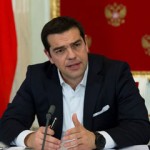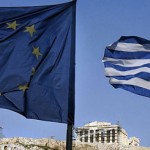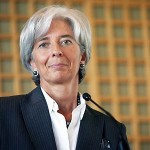IMF calls on ECB to consider quantitative easing

The International Monetary Fund is expected to sound the alarm on Thursday over the risk of deflation within the eurozone and to urge the European Central Bank to consider US-style quantitative easing, including “large-scale” purchases of sovereign bonds, to stimulate growth.
The warning, contained in a draft concluding statement of the IMF’s annual evaluation of the eurozone’s economic health obtained by the Financial Times, threatens to reignite a tense debate within the EU over how to respond to the risk of a Japan-style “lost decade” of stagnant growth.
The IMF evaluation, to be presented by managing director Christine Lagarde to eurozone finance ministers on Thursday in Luxembourg, credits the EU with taking “strong policy action” that “laid the foundations for recovery” after the eurozone crisis. But it also concludes that both debt levels and unemployment remain too high and could impair a return to “robust” growth.
While the fund welcomes recent measures adopted by the ECB, which earlier this month took the unprecedented step of cutting one of its key interest rates below zero and offering up to €400bn in cheap loans to banks who agree to lend to small businesses, it suggests they may not be enough.
The draft IMF statement finds that eurozone “inflation is worryingly low, including in the core countries”, stifling demand and growth. If prices continue to rise slowly, the IMF argues, the ECB should consider following the US Federal Reserve, the Bank of Japan and the Bank of England by purchasing sovereign bonds.
“If inflation remains stubbornly low, the ECB should consider a large-scale asset purchase programme, primarily of sovereign assets according to the ECB’s capital key,” the statement reads. “This would boost confidence, improve corporate and household balance sheets, and stimulate bank lending.”
At 0.5 per cent, eurozone inflation is little over a quarter of the ECB target of below but close to 2 per cent. Although the IMF could revise its recommendations after discussions with finance ministers, in the past such changes have been minimal.
Germany has been buffeted recently by a domestic fight over this month’s ECB’s measures. Although the influential Bundesbank backed the ECB governing council’s decision, German bankers attacked the move, saying it unfairly punished savers.
The IMF has repeatedly urged the ECB to be more aggressive throughout the eurozone crisis, and some IMF officials have urged such US-style bond purchases in the past. But coming just two weeks after the controversial ECB decision – and in the IMF’s signature annual review of the eurozone’s economy – the public warning could cause a new storm within Germany.
In a speech in March, Jens Weidmann, the Bundesbank president, said QE was not “generally out of the question”. However, he added that his assessment of whether the scheme violates the ECB’s mandate, which prohibits the monetary financing of governments, would be “a strict one”.
ECB-watchers also believe the German public would be hostile to large-scale asset purchases by the central bank, seeing them as a bailout of the eurozone’s weaker members.
Mario Draghi, the ECB president, has signalled the central bank would be ready to embark on QE should inflation remain worryingly low. However, many analysts viewed the strength of the steps announced earlier this month as an attempt by the central bank to avoid having to resort to government bond buying at least until the end of this year.
The differences between the IMF and ECB over eurozone monetary policy have in recent months led Mr Draghi to squabble publicly with the fund. During a news conference in April, he sarcastically thanked the IMF for being “extremely generous in its suggestions”, adding that it should pay equal attention to the US Federal Reserve – implying that the IMF has unfairly singled out the ECB for criticism.
Source: FT




























